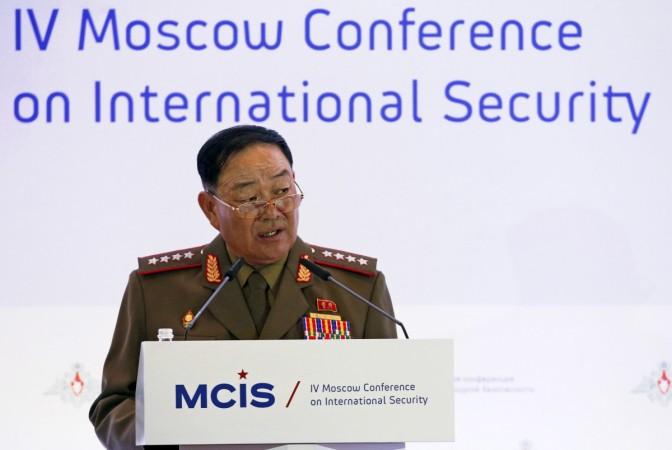
North Korea has executed its defense chief on treason charges by putting him in front of an anti-aircraft gun at a firing range, Seoul's National Intelligence Service (NIS) told lawmakers.
Hyon Yong Chol, 66, who headed the isolated country's military, was purged late last month for disobeying Kim Jong Un and falling asleep during a meeting at which North Korea's young leader was present, according to South Korean lawmakers briefed in a closed-door meeting with the spy agency on Wednesday.
His execution, the latest of a series of high-level purges since Kim took power in 2011, was watched by hundreds of people, they said.
It was not clear how the NIS received the information and it is not possible to independently verify such reports from within secretive North Korea.
Hyon, last known to have spoken publicly at a security conference in Moscow in April, was said to have shown disrespect to Kim by dozing off at a military event, the Seoul lawmakers said, citing the agency briefing.
Hyon was believed to have voiced complaints against Kim Jong Un and had not followed his orders several times, according to the lawmakers. He was arrested late last month and executed three days later without legal proceedings, the NIS said.
The reported execution comes after South Korea's spy agency said late last month that Kim ordered the execution of 15 senior officials this year as punishment for challenging his authority.
In all, around 70 officials have been executed since Kim took over after his father's death, Yonhap news agency cited the NIS as saying.
"North Korean internal politics is very volatile these days. Internally, there does not seem to be any respect for Kim Jong Un within the core and middle levels of the North Korean leadership," said Michael Madden, an expert on the North Korean leadership and contributor to the 38 North think tank.
"There is no clear or present danger to Kim Jong Un's leadership or stability in North Korea, but if this continues to happen into next year, then we would seriously have to start looking at a contingency plan for the Korean peninsula".
The lawmakers said Hyon was executed at a firing range at the Kanggon Military Training Area, 22 km (14 miles) north of Pyongyang.
The U.S.-based Committee for Human Rights in North Korea said last month that, according to satellite images, the range was likely used for an execution by ZPU-4 anti-aircraft guns in October. The target was just 30 meters (100 feet) away from the weapons, which have a range of 8,000 meters, it said.
"The gut-wrenching viciousness of such an act would make 'cruel and unusual punishment' sound like a gross understatement," the group said on its web-site.
"Given reports of past executions this is tragic, but unfortunately plausible in the twisted world of Kim Jong Un's North Korea."
INSULAR, OPAQUE
North Korea is one of the most insular countries in the world and its ruling power structure is highly opaque. The current leader is the third generation of the Kim family that has ruled with near-absolute power since the country was established in 1948.
But the hierarchy around them has long been subject to infighting and factionalism which makes it impossible for outsiders to ascertain who makes decisions, and why.
In 2013, Kim purged and executed his uncle, Jang Song Thaek, once considered the second most powerful man in Pyongyang's leadership circle, for corruption and committing crimes damaging to the economy, along with a group of officials close to him.
Pyongyang's military leadership has been in a state of perpetual reshuffle since Kim Jong Un took power.
Kim, who is in his early thirties, has changed his armed forces chief four times since coming to power. His father Kim Jong Il, who ruled over the isolated nuclear-capable country for almost two decades, replaced his chief just three times.
Hyon, a little-known general, was promoted within the military at the same time as Kim Jong Un in 2010. He later became a vice marshal of the North Korean army in 2012.
The South Korean spy agency told lawmakers that Ma Won Chun, known as North Korea's chief architect of new infrastructure under Kim, was also purged.
Ma had also once served as vice director of the secretive Finance and Accounting Department in the ruling Workers' Party and, up until recently, was effectively the regime's money man.
He had been regularly photographed alongside Kim Jong Un in state propaganda images, but had not made any reported appearances since November last year.

















